| Srl | Item |
| 1 |
ID:
176215
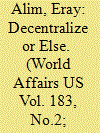

|
|
|
|
|
| Summary/Abstract |
Drawing on the concept of offensive coercive diplomacy, this article examines Russia’s strategy in the conflict in Eastern Ukraine and addresses the question of why Russia has failed to achieve its objectives. Through an analysis of notions such as “status quo” (in terms of who overturned it) and international law (in terms of who violated it), I attempt to show that Russia’s actions in Eastern Ukraine qualify as offensive coercion. Backed up by force, Russia demanded that Ukraine implement a decentralization process and grant a part of Eastern Ukraine (Donbas) special status. Knowing that Russia’s aim is to use Donbas as an instrument to control its political future, Ukraine refused to acquiesce to Russia’s demand without restoring its sovereignty in Eastern Ukraine. With both sides refusing to budge, the crisis turned into a zero-sum game. This article seeks to contribute to research on coercive diplomacy by focusing on offensive coercion.
|
|
|
|
|
|
|
|
|
|
|
|
|
|
|
|
| 2 |
ID:
186997
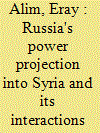

|
|
|
|
|
| Summary/Abstract |
By analysing Russia's engagements with Israel and Turkey in the Syrian theatre, this article sheds light on the kinds of interactions that may occur between an external great power and local states following the former's projection of power into the latter's region. The literature on power projection examines interactions between regional and extra-regional actors in the context of competition between great powers, thus overlooking interactions between great powers and non-great powers. Other literature, such as that on coercive diplomacy, does deal with this neglected issue, but it treats local states as the great power's target states. This, however, need not be the case, since great powers may engage local states while pursuing wholly different goals in a region. As this article illustrates, although Israel and Turkey have not been Russia's target states, Russia has frequently interacted with them to ensure that they refrain from acts harmful to its interests in Syria. Russia has succeeded in this endeavour, as local states have mostly complied with Russia's rules and restrictions while operating in Syria. When this was not the case, Russia introduced restrictive or punitive measures against Israel and Turkey, which enabled Moscow to keep the local environment conductive to its interests.
|
|
|
|
|
|
|
|
|
|
|
|
|
|
|
|
| 3 |
ID:
188366
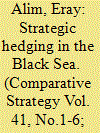

|
|
|
|
|
| Summary/Abstract |
Although strategic hedging has attracted increasing scholarly attention in the study of how secondary states manage their relations with a neighboring great power, existing works on the subject suffer from a serious defect: privileging unit-level variables over structural determinants and security imperatives. The crux of secondary state hedging, however, is to manage the power imbalance against a local great power and security requirements must therefore be considered as the prime determinant behind decisions to embrace hedging strategies. I shall examine this hypothesis against the empirical evidence provided by the case of Turkey and Russia in the Black Sea region.
|
|
|
|
|
|
|
|
|
|
|
|
|
|
|
|
| 4 |
ID:
186935
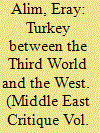

|
|
|
|
|
| Summary/Abstract |
This article analyzes the reasons behind the Third World-averse and overtly pro-Western character of Turkish foreign policy by focusing on the period 1961–65. I argue that Turkey’s lopsided foreign policy approach resulted from the failure to comprehend the advent of the Post-colonial phase of international relations and the leadership’s dismissal of non-alignment as a policy strategy in world politics. These factors resulted in Turkey’s overreliance on its alliance with the West through NATO. However, as the Cyprus Crisis of the early 1960s illustrates, the West was not always willing to support Turkey’s position.
|
|
|
|
|
|
|
|
|
|
|
|
|
|
|
|
| 5 |
ID:
187546
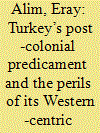

|
|
|
|
|
| Summary/Abstract |
Turkey’s relations with the post-colonial world have been marked by aloofness.1 Despite priding itself on having achieved a free and independent state after waging a war of independence against European powers following the defeat of the Ottoman Empire in the First World War, Turkey, for most of its republican history, has given secondary importance to its relations with the Third World.2 Even when Turkey did build warm relations with post-colonial nations, it did so with those that were politically pro-Western, such as US-backed East Asian states. During the Cold War in particular, Turkey’s foreign policy approach was based on privileging the country’s relations with the West over non-aligned post-colonial nations. This meant that a significant part of the Global South stayed out of Turkey’s foreign policy orbit
|
|
|
|
|
|
|
|
|
|
|
|
|
|
|
|